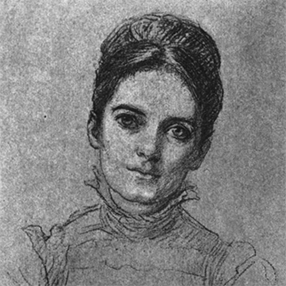I dreamed my Lady and I were dead
And dust was either heart;
Our bodies in one grave were laid,
Our souls went far apart,
Hers with the saints for aye to dwell
And mine to lie and pine in Hell.
But when my Lady looked for me
And found her quest in vain,
For all that blessed company
She knew nothing but pain.
She cried: “How feigned your praising is!
Your God is love, and love I miss.”
The hills whereon her tear-drops fell
Were white with lily-flowers.
They made the burning caves of Hell
As green as Eden-bowers,
Unloosed my tongue, my fetters broke,
“Praised be love,” I cried and woke.
This poem is in the public domain. Published in Poem-a-Day on June 30, 2024, by the Academy of American Poets.
“Love Stronger than Death” appears in Agnes Mary Frances Duclaux’s first poetry collection, A Handful of Honeysuckle (C. Kegan Paul & Co., 1878). The book was published under her maiden name, A. Mary F. Robinson. In her book, A. Mary F. Robinson: Victorian Poet and Modern Woman of Letters (McGill-Queen’s University Press, 2021), Patricia Rigg mentions that the poems in Honeysuckle suggest “escape from nihilistic despair […] through transcendent love as a way to fill the spiritual void into which Robinson’s speakers fall from time to time.” Rigg goes on to say that “Love Stronger than Death” evokes the imagery of Dante Gabriel Rossetti’s “Blessed Damozel” and the “degree of separation between lovers as they journey upward toward heaven.” In “Cosmopolitan Aestheticism: The Affective ‘Italian’ Ethics of A. Mary F. Robinson,” scholar of nineteenth-century literature and associate dean at Birkbeck, University of London, Ana Parejo Vadillo, states, “A Handful of Honeysuckle (1878), clearly under the influence of Pre-Raphaelitism […] created an aesthetic world embedded in a European ‘Ideal’ past ([Robinson] was an Idealist and saw the world as a sign and symbol of the soul) that jarred with Victorian mass culture.”

